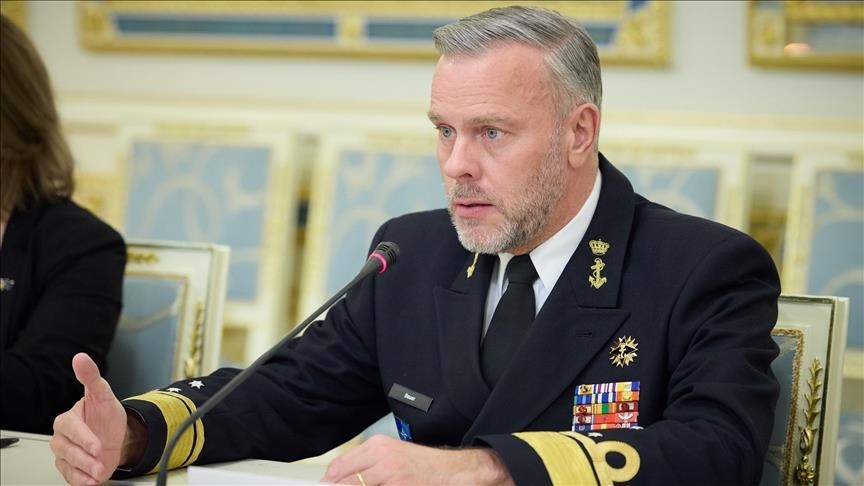Top NATO official calls North Korea’s involvement in Ukraine 'strategic mistake'
China cannot say it wants to maintain good relations with the West while continuing to fuel the war in Europe, says NATO military committee chair Admiral Bauer

ANKARA
North Korea’s military involvement in Ukraine is a "strategic mistake," the chairman of NATO’s military committee said Thursday, while also criticizing China.
Not only Russia but also China allowed North Korea’s military involvement in the war in Ukraine, Admiral Rob Bauer told a news conference following a meeting of the Military Committee in Chiefs of Defense in Brussels.
Those two countries "have stopped supporting the UN in terms of the Security Council resolutions on North Korea with regard to the missiles and the nuclear program," Bauer said.
"It is a huge change that North Korea, the most isolated country in the world, now suddenly is a player…that they are in Europe fighting for the Russians. It means that the Indo-Pacific is now suddenly connected to the European theater in a way that nobody thought for possible. That has huge consequences," he added.
Bauer also described North Korea’s involvement as a "strategic mistake" due to their army’s unknown performance.
"We know it's about 11,000 soldiers that are in the Kursk region used by the Russians," he said, adding that almost a third of them were "wounded and killed, and actually they are used in a not very effective way, because there is a language problem with the Russians."
At least 300 North Korean soldiers were killed in combat with Ukraine and some 2,700 were injured, South Korea’s National Intelligence Service said Monday, according to the Seoul-based Yonhap news.
Pointing out a lack of coordination "between the Russians and the North Koreans," the admiral added that the North Korean troops were also not used in "very favorable positions by the Russians."
Criticizing China for its stance, Bauer also stressed the need for NATO to give a "united strong response."
"NATO has explicitly said to China, ‘You cannot have it both ways.’ China cannot, on the one hand, say it wants to maintain good relations with the West and claim to uphold the UN Charter and at the same time keep fueling the war in Europe," he emphasized.
The Russian-Chinese relationship is also “very unclear” about where it leads, and its impacts in the long term are also "of great concern," according to the admiral.
Admiral Pierre Vandier, Supreme Allied Commander Transformation, stressed that the alliance was in the current landscape "in a race" for transformation, innovation and adaptation "in order to outpace the enemy, to be quicker than him."
While the US and NATO have backed claims by Seoul that North Korean soldiers were in the field against Ukraine, Pyongyang has maintained silence even after reports of alleged deaths and injuries among its troops.
The reports of troop deployment have assumed significance since Pyongyang and Moscow signed a comprehensive defense pact last year, requiring either party to extend military help to each other in case of aggression by a third party.
The Russia-Ukraine war will complete three years next month after Moscow launched its “special military operation” against Kyiv in February 2022.
Thousands of people have been killed and millions displaced across the two warring nations.
Support for Ukraine
Officials at the meeting, who reiterated strong and continuous support for Ukraine, also noted that the alliance’s policy would not change with a new president in the White House, as US President-elect Donald Trump is due to take office on Monday.
NATO’s support for Ukraine was designed as "enduring for a few reasons," said Supreme Allied Commander Europe, General Christopher G. Cavoli.
"The first reason is that it is the express political intention of the nations of this alliance to continue to support Ukraine. The second reason is because we have actually established structures to do it…So we have put into place procedures and institutions that are designed to endure," Cavoli said.
Bauer said NATO’s responsibilities would not "change on Monday" and noted that “the enduring contributions and the enduring mechanisms that are now in place" are "reassuring" for Ukraine’s Commander-in-Chief of the Armed Forces, Oleksandr Syrskyi, "because for him, the war does not change because of what happens in the White House. The war is there on Monday as well. And so he needs continued help."
As Trump prepares to take office on Jan. 20, Europe’s attention is focused on possible foreign policy shifts in the country’s support for Ukraine, as ending the war was one of his major campaign promises.








